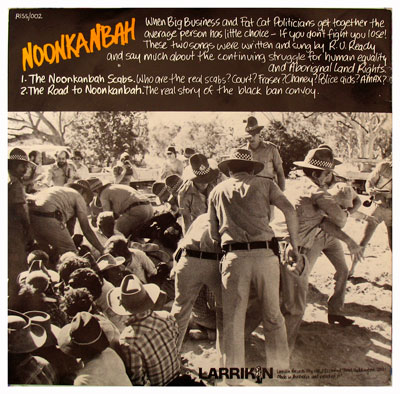Larrikin Records and Larrikin Music Founder Speaks Out
An Article by Warren Fahey
| ABC Radio National interview 9 February 2010 |
The founder of Larrikin Records and original owner of Larrikin Music, Warren Fahey, has suggested a way of resolving the dispute over the use of Kookaburra Sits in the Old Gum Tree by Men at Work in its iconic: Land Down Under" hit.
Fahey wants the copyright owners, Larrikin Music, to 'gift' the song to Australia, arguing that most Australians believe they already have public domain ownership.
Having remained silent during the lead-up to the now infamous court ruling on Men At Work's use of the Marion Sinclair children's composition, Kookaburra Sits On An Old Gumtree", Larrikin's founder, the cultural historian, Warren Fahey, said today he had been forced to enter the fray.
"The past week has seen thousands of emails, letters to the editor, radio commentary and internet forums criticising the judgement," Fahey said.
"Many of these incorrectly criticise Larrikin Records and myself as the protagonist asking, "how could someone so dedicated to Australian music do such a thing""
 Warren Fahey sold Larrikin Music to Music Sales Corporation in 1988 and, in 1995; Larrikin Records was sold to Festival Music. Warren"s internationally recognised folk ensemble, established in 1969, is still called The Larrikins.
Warren Fahey sold Larrikin Music to Music Sales Corporation in 1988 and, in 1995; Larrikin Records was sold to Festival Music. Warren"s internationally recognised folk ensemble, established in 1969, is still called The Larrikins.
He comments, "The Larrikin brand has certainly been tarnished by what many see as opportunistic greed on behalf of Larrikin Music/Music Sales."
The Court has ruled that Larrikin Music indeed owns the 'Kookaburra' song and that Men At Work used part of that melody in their internationally successful song 'Land Down Under'.
Although many dispute this ruling it is now legally sanctioned. The point at issue here is a cultural copyright issue, says Fahey. "Like 'Happy Birthday' this song is seen as being in the Public Domain. The fact that there are so many parodies in circulation and that Australians have been singing the ditty for so long is testament to this anonymous circulation.
Fahey continues, "Happy Birthday is a good comparison because it was written under similar circumstances and entered the oral tradition before being taken up by a commercial publisher. Composed by two American kindergarten teachers in 1893 as 'Good Morning To All' the original composers never claimed copyright or publishing. Even when published as sheet music in 1912 it was never claimed by composer of publisher. In 1935 a publisher named Summy Music published an arrangement, changing the title to 'Happy Birthday To You', and credited two new composers.
By this time the song had really entered Public Domain. In 1990 Warner Chappell Music purchased Summy Music for $15,000,000 and has tried, unsuccessfully, to enforce its publishing right (which expires in 2011). Several Law Professors in the USA have already defended the song as Public Domain and any publishing claim unenforceable."
"The above reinforces the 'Kookaburra' claim of Public Domain in Australia. Copyright is a strange beast and Public Domain even stranger.
Australian musicians are rightfully angry about the decision because the creation of music is always influenced to some degree by other music. This ruling is seen as a threat to musical creativity and, to some extent, the Australian spirit of larrikinism.
Warren Fahey has what he says is a solution. "Larrikin Music, as the legitimate publishers of the Marion Sinclair song, have a right to claim for its use" even if many see this Men At Work claim as inappropriate and aggressive.
"As a cultural historian and one who has specialised in music I call upon Larrikin Music to 'gift' this song to the nation - which obviously already believes it has public domain ownership of it.
"Larrikin Music should be entitled to collect an appropriate settlement if they see fit but then should allow the song its own life so as to ensure future young Australians can sing and perform it for generations to come, without limitation.
"As an assessor for the Commonwealth Cultural Gift Program I would suggest that there might even be an attractive financial benefit to Larrikin Music from such a cultural gift. Such a gift would also been seen as an appropriate larrikin action!"
Note
Many thanks to Warren Fahey for permission to add this article to the Australian Folk Songs collection
Visit Warren's Australian Folklore Unit at http://www.warrenfahey.com/